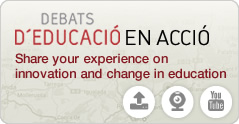- Català
- Español
- English
You are here
How can we build an engaged educational community? How can we fight disaffection with school?
About the speaker
Valerie Hannon
Director, Consultancy Support in Learning Futures and Learning Frontiers (Global Education Leaders’ Program)
Main ideas
The problem of disaffection with education that many students experience is a concern around the world, both in countries with good academic results and those with more negative results. It is a warning sign that something in the educational system is not working.
Disaffection is understood as the students’ lack of implication and engagement in education. It is not a question that only affects those students with the worst results. A Canadian study reached the conclusion that student engagement is highest during the first stages of education and becomes a lot lower in secondary education.
A distinction needs to be made between engagement with the school and engagement with education.
- Engagement with the school is measured in terms of attendance, attention, behaviour or results.
- Engagement with education is measured in terms of enthusiasm and energy to learn or take responsibility for education.
A study from the University of Bristol determined that to achieve greater engagement with education, it had to meet a series of functions.
- Learning has to go beyond the school. It has to be involved in day-to-day activities.
- Students have to want to share with classmates.
- It has to be based on memorable experiences.
- It has to be relevant, connected to life and not just about the next test.
There is evidence that this meaningful education that encourages engagement is not being provided.
- In Finland, a study of 15,000 students between the ages of 13 and 15 determined that 30% of these students did not feel a sense of engagement.
- In South Korea, with high levels of unemployment, there are many young people dropping out of their studies because they feel their education is not linked to their future.
- In an interview, the head of Human Resources at Google said that 40% of their employees did not have a university degree because they valued the impression made by candidates in interviews more highly.
The education currently offered does not always prepare students for the needs of 21st-century life. We now need inspired students who learn throughout their lives. Technology provides many educational tools that were unthinkable in the past. This does not mean that we do not need schools, but they do have to change. They do not have to improve, they have to be transformed.
To achieve higher levels of engagement, students need to be better motivated. A study by the Innovation Unit NGO determined three basic elements for motivation.
- Commitment. Students have to be committed to the changes. They need to be given a voice so that they can give their opinion on the education they want.
- Leadership. They have to lead the change management.
- Engagement. They have to be engaged in the development of the change processes.
The Learning Frontiers initiative, developed in Australia, aims to create successful learners who are self-assured and active citizens. To do so, analysis of different studies and experiences was carried out to find the key to motivation and what inspires students. The four basic principles they determined are:
- Learning has to involve co-creation, both for students and teachers.
- It has to be a learning that is connected to the surroundings.
- It has to be personalised learning. Each individual has certain needs and characteristics that the learning has to respect.
- It has to be integrated.
An example of best practices in this area is San Diego’s High Tech High:
- It requires high quality in students’ practicals. Motivation and excitement are increased if there a big challenges.
- Student integration.
- Interdisciplinary teaching and teachers.
- The teachers design the learning environments.
Discover
other ideas
-

Conference
Debats d'Educació
2014 -

Envisaging the future of education. 10 years of de...
Núria García Quera and Júlia Martí Comas
2014 -

Social Open Learning: Can Online Social Networks T...
Philipp Schmidt
2014






 The texts published on this website are, unless otherwise indicated, covered by the Creative Commons Spain Attribution - Non Commercial - No Derivs 3.0 licence. You may copy, distribute and transmit the work, provided you attribute it (authorship, journal name, publisher) in the manner specified by the author(s) or licensor(s). You may not use the material for commercial purposes. You may not transmit any derivative work from this material. The full text of the licence can be consulted here:
The texts published on this website are, unless otherwise indicated, covered by the Creative Commons Spain Attribution - Non Commercial - No Derivs 3.0 licence. You may copy, distribute and transmit the work, provided you attribute it (authorship, journal name, publisher) in the manner specified by the author(s) or licensor(s). You may not use the material for commercial purposes. You may not transmit any derivative work from this material. The full text of the licence can be consulted here: